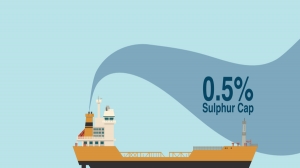


(Posted on 02/02/20)
The transition to low sulphur fuels has so far been smooth, thanks to the efforts of shipping industry stakeholders in preparing for the change, which entered into force on 1st January this year.
However, there are some issues arising over the margin for error in testing the sulphur content and the presence of sediment is causing concern in some areas, warns maritime law specialist Hill Dickinson.
And, as the 1st March deadline for part two of the regulations looms, the legal expert advises ship operators to start planning now to debunker any remaining high sulphur fuel in good time.
Beth Bradley, a London-based Partner at Hill Dickinson, explains: “It is nearly a month from the implementation date of Regulation 14.1.3 of Marpol Annex VI and, while it is too early to draw firm conclusions, a couple of themes are emerging as a result of the change.”
Regulation 14.1.3 Marpol Annex VI, lowers the sulphur content for marine fuel for use on board vessels not fitted with exhaust gas cleaning equipment from 3.5% m/m to 0.50% m/m and took effect of 1 January 2020 (the ‘sulphur cap’). Regulation 14.4.3 Marpol Annex VI limiting sulphur content to 0.10% m/m in Emission Control Areas remains in place.
In the opening weeks of 2020 there have been very few reports of enforcement action taken against vessels for non-compliance with the sulphur cap. Consequently, the transition has been smoother than expected from a port state control perspective. This is in no small amount attributable to the efforts of the key stakeholders (owners, charterers, insurers and bunker suppliers) to prepare to be compliant as of 1 January 2020.
While this suggests a high level of compliance, it is only part of the picture, warns Ms Bradley, explaining that issues relating to the sulphur content of fuel, as well as the quality of some blended low sulphur fuels, are already arising.
Compliance with Regulation 14.1.3 means using a fuel with a sulphur content of 0.50% m/m maximum. If the sulphur content exceeds that threshold, owners may be exposed to enforcement action. Consequently, the frequency of owners having samples tested for sulphur content has increased.
Where the bunkers are found to be marginally in excess of the limit, problems are arising largely owing to the difference between Regulation 14.3.1 and most supply contracts. An on-specification supply for sulphur content will, usually, from a suppliers’ point of view be deemed to be up to 0.53% m/m, since that reflects the laboratory margin of confidence for testing.
“As a result, a time consuming and costly stand-off can occur while the sulphur content issue is resolved and decisions made regarding whether to de-bunker and obtain alternative bunkers,” says Ms Bradley.
In addition, over the past four weeks there have been a number of alerts issued concerning sediment issues, in particular, in low sulphur fuels supplied in Singapore, Piraeus, Amsterdam, Rotterdam, Miami and San Vincente. The propensity to sediment can cause engine problems, from sludging of filters to engine damage and blackouts in the worst circumstances.
Ms Bradley warns: “Quality claims relating to bunkers are not a new phenomenon but, in the past, they have tended to be localised. The spread of alerts concerning sediment, suggests a potentially wider issue concerning the stability of some blended low sulphur fuel.”
She cautions: “Liability, depending on the reasons for sedimentation, may not be straightforward. While charterparties and bunker supply contracts will contain a specification for the fuel, usually by reference to the ISO 8217 standard, some organic compounds which cause sedimentation may not be caught by the Table Two parameters (although the issue may be caught by clause 5.3 of ISO 8217).”
AtoB@C Shipping, a subsidiary of ESL Shipping, has announced the successful delivery of Fleximar, the... Read more
Western Bulk, together with reputable Norwegian partners A/S J. Ludwig Mowinckels Rederi, Premium Maritime... Read more
Pacific Basin Shipping Limited, one of the world’s leading dry bulk shipping companies, has announced... Read more
Columbia Group anticipates a period of strong expansion as an increasing number of international shipowners... Read more
Norse?Ship Management has expanded its use of Smart Ship Hub’s high frequency sensor data and... Read more
As the maritime industry gears up to welcome the IMO’s STCW bullying and harassment training amendments... Read more
NORDEN has acquired the cargo activities of Taylor Maritime in Southern Africa (previously operated... Read more
Philippos Ioulianou, Managing Director of EmissionLink, has warned the IMO’s decision to delay... Read more
VIKAND has highlighted the need for cultural change in the maritime sector as reports of bullying, harassment... Read more
The maritime industry is experiencing a period of significant transformation, driven by rapidly evolving... Read more